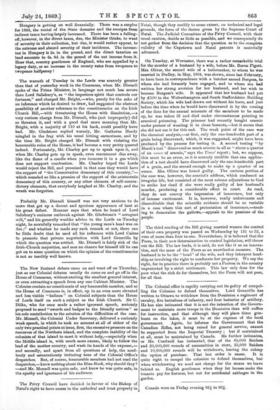The warmth of Tuesday in the Lords was scarcely greater
than that of yesterday week in the Commons, when Mr. Disraeli spoke of the Prime Minister, in language not much less severe than Lord Salisbury's, as "the imperious spirit that controls our fortunes," and charged Mr. Bright,—who, purely for the sake of an inference which he desired to draw, had suggested the abstract possibility of another reference to the constituencies on the Irish Church Bill,—with threatening the House with dissolution,—a -very curious charge from Mr. Disraeli, who (not improperly) did so threaten it, and with a good deal more meaning than Mr. Bright, with a majority of 110 at his back, could possibly have had. Mr. Gladstone replied warmly, Mr. Gathorne Hardy mingled in the fray with his usual hitting earnestness, and by -the time Mr. Bright charged Mr. Disraeli with violating the honourable rules of the House, it had become a very pretty quarrel indeed. Fortunately, Mr. Charley got up to speak upon it, and when Mr. Charley gets up to speak, even resentment dies away, like the flame of a candle when you immerse it in a gas which does not support combustion. Mr. Charley hoped the Lords would reject the Bill, and promised in that case they would have -the support of "the Conservative democracy of this country,"— which sounded so like a promise of the support of the aristocratic democracy of this country, or any other chimera of self-contra- dictory elements, that everybody laughed at Mr. Charley, and the wrath was forgotten.






























 Previous page
Previous page